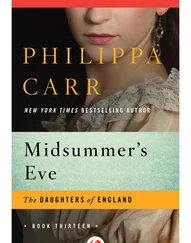I had decided that as soon as the potage was hot they should eat, so I summoned them to the table and the great steaming dish was brought in. The contents soon disappeared, and while they ate I was able to take stock of our guests, who were all colourful and all spoke in resonant voices, giving great importance to the most trivial comment.
The leader of the troupe and his wife made much of the children, who were overcome with excitement.
Then the snow started to fall, and Monsieur Lamotte, the leader, declared that it was fortunate indeed that they had come upon Castle Plenty in good time. I was apologetic about Castle Plenty, and, as I pointed out to them, we were so unaccustomed to guests that I feared we could not entertain them as we would wish.
How exciting their conversation seemed. They talked of their plays and their parts and the places in which they had played, and it seemed to us all listening that an actor’s life must be the most rewarding in the world. Jeanne and Marianne, with Jacques, came and stood in the hall listening to the conversation which seemed to grow more and more sparkling as time progressed. I sent Jacques to tell the Lambards that they must come over to see the play. He came back and told me how excited they were at the prospect.
Harriet was less talkative than the others. I saw her looking around the hall as though judging it—comparing it I suspected with other places in which she had lived. Then I would find her eyes on me, watching me intently.
She was seated next to the very handsome young man—whom they called Jabot. I thought he was a little conceited because he always seemed to demand attention. When Angie went to him and, placing her hands on his knees, looked up in adoration at his face and said: “You are pretty,” everyone laughed, and Jabot was so delighted that he picked her up and kissed her. Poor little Angie, overcome with shyness, immediately wriggled free and ran out of the hall, but she came back to stand some distance away where she could not take her eyes from Jabot.
“Another admirer for you, my boy,” said Madame Lamotte, and everybody laughed.
Fleurette, the other female player, her lips tightening I noticed, said: “We must tell the little one that Jabot is constant to none.”
Harriet shrugged her shoulders and replied: “That is a commonplace,” then she started to sing in a deep rich voice:
“Sigh no more ladies,
Men were deceivers ever …”
And everyone laughed.
They sat a long time at the table and I went into consultation with Jeanne and Marianne. We must give them supper after the play, which was to take place at six o’clock, and we must make sure it was a good supper. What could we do?
They were determined to provide the best possible supper in the circumstances. Jacques was already busy bringing their trappings into the hall. The children stared on in wonder at the carpetbags in which tawdry garments could be seen—but they did not seem tawdry to us then. The players had brought an enchantment with them.
They would sleep in the hall, they said. They had rugs and blankets, and they would be off next morning as soon as it was light. They must not be late for their engagement in Paris.
I protested. They must not sleep on the floor. The château was not grand by any means, it was little more than a farmhouse, but at least we could put a few rooms at their disposal.
“The warmth of your welcome is like a hot cordial on a cold day,” declaimed Monsieur Lamotte.
That was a night to remember. The candles were burning in their sconces and what an entranced audience we were. The tall Lambard sons, usually so vocal, were silent in wonder, and the rest of us shared in their awe. The children sat cross legged on the floor. By good luck there was a dais at the end of the hall and this they had turned into a stage.
The play was The Merchant of Venice. Harriet was Portia, and of all the players she was the one from whom I could not take my eyes. She was clad in a gown of blue velvet with something glittering round the waist. Daylight would show the velvet to be rubbed and spotted, the girdle some cheap tinsel stuff, but candlelight hid the imperfections and showed us only that beauty in which we were only too ready to believe.
This was magic. We had never seen real players before. We had dressed up now and then and played our charades, but this seemed to us perfection. Jabot was a handsome Bassanio; Monsieur Lamotte was a wily Shylock with a hump on his back and a pair of scales in his hand. The younger children cried out in horror when he appeared in the court scene, and Angie wept bitterly because she thought he really was going to take his pound of flesh. “Don’t let him, don’t let him,” she sobbed, and I had to console her and tell her to wait and see how Portia was going to make it all come right.
How she declaimed, how she tossed her head. And how incredibly beautiful she was! I shall never forget Harriet as she was that night, and they could never played before a more appreciative audience than we were. We were all so innocent and inexperienced. Jacques watched, his mouth agape, Lucas was in ecstasies and the little ones were amazed that there could be such wonders in the world.
When the last scene had been played and Bassanio united with Portia, the children embraced each other and laughed with joy and I think we all felt a little bemused.
Monsieur Lamotte made a little speech and said he thought we had enjoyed his little play and as for himself he had never played before a more appreciative audience—which I imagine was true.
The maids scurried to the kitchens, and props were cleared away and very soon we were sitting down to a meal such as, I was sure, had rarely been served before in Château Congrève.
There was magic abroad that night. Dick whispered to me that our good fairies had sent the snow so that those wonderful people could come to Congrève. The Lambards stayed to supper and Madame Lambard brought in a great pie full of chicken and pork topped with a gold-brown crust. She had heated it in the oven, she said, and had she known how we were to be honoured, the crust should have been made to represent a stage, for, she confided, she was a dab hand with a bit of pie crust.
Monsieur Lambard brought in a cask of wine. This was an occasion we should never forget.
The children were too excited to be sent to bed and I said that as a special treat they might stay up … even Fenn. Though it was true that before long he was fast asleep on Madame Lamotte’s lap.
They talked … all of them at the same time, for it was clear that they preferred talking to listening, so there were several conversations going on, which annoyed me as I could not bear not to hear all that was being said. Monsieur Lamotte, as the head of the group, had taken the place on my right hand and he engaged me in conversation, and he told me of the plays which he had acted in and the towns throughout the country where he had played.
“My ambition is to play before King Louis himself. He is a lover of the theatre, which is what we would expect of one of such talents, eh? What they want is comedy, I believe. We need good comedies. There is enough tragedy in the world, little lady. People want to laugh. Do you agree?”
I was ready to agree with anything he said. I was as bemused as the rest.
Harriet was seated halfway down the table next to Jabot. They were whispering together and she seemed angry. … I noticed that Fleurette was watching them. There was some drama going on there. I was very interested in what Monsieur Lamotte was saying but I was intrigued by Harriet. I should have liked to know what she and Jabot were quarrelling about.
I was glad when the conversation became general and they all started talking of their plays and acting little bits for us. Harriet sang—most of them songs we knew from Shakespeare. She sang in French and then in English, and the one I remembered particularly was:
Читать дальше












